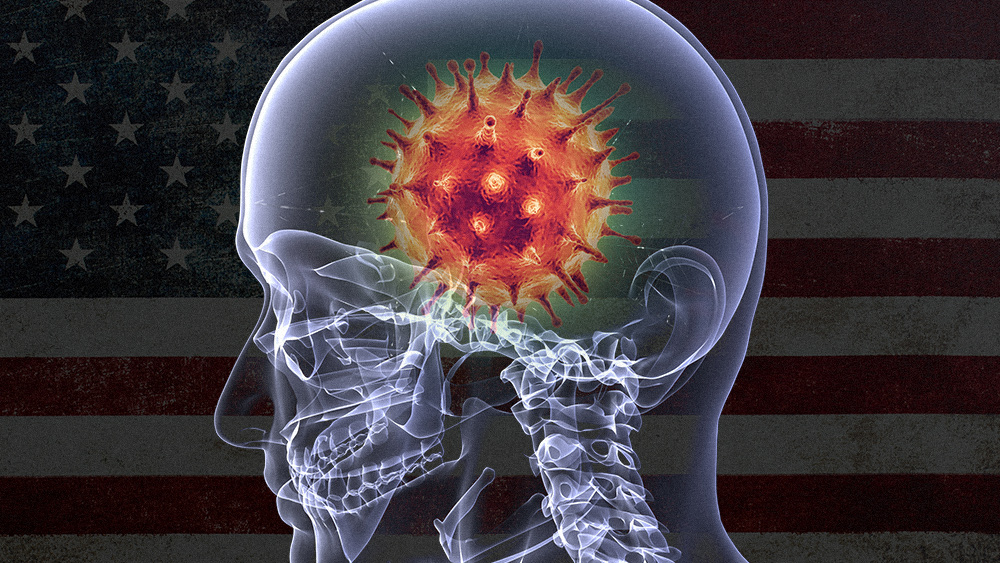Study finds many Wuhan coronavirus infection survivors experience cognitive issues
03/22/2021 / By Ramon Tomey

Many people who survive a bout of Wuhan coronavirus infection experience complications that affect their brain function, according to a recent study. A recent study published in Frontiers in Psychology examined the long-term effects of SARS-CoV-2 infection on the brain and the possible short- and long-term mental health issues surviving patients face. The paper was the result of efforts by both psychology and psychiatry researchers who looked at existing published studies and their findings.
The researchers found that COVID-19 survivors reported a wide range of neuropsychiatric conditions in the short term. One study found that 95 percent of clinically stable COVID-19 patients had post-traumatic stress disorder. Other studies reported 17 percent to 42 percent of patients experiencing affective disorders such as depression. Meanwhile, 45 percent of patients reported impaired attention in the short-term, while 13 to 28 percent of patients experience short-term memory impairment.
Affective disorders and fatigue were the long-term neuropsychiatric problems recorded in most COVID-19 patients. Forty-four percent of patients reported impaired attention, while 28 percent to 50 percent of patients said they experienced impaired memory.
Study author Sanjay Kumar said in a statement: “Understanding the neuropsychiatric and cognitive consequences of COVID-19 is important, as millions of people have been affected by the virus, and many cases of undetected. The Oxford Brookes University psychology senior lecturer warned that “even [if] just a fraction of patients experience neuropsychiatric complications, the impact of public health services could be significant.”

Experts have said there is a likely spike in the number of patients with psychiatric and cognitive problems who did not have these conditions prior to contracting COVID-19. Kumar said these problems “affect people’s capacity to work effectively, drive, manage finance, make informed decisions and participate in daily family activities.”
The senior lecturer suggested the use of detailed cognitive evaluation and robust patient monitoring to detect new neurological cases. “This will also enable healthcare providers to plan adequate health care and resources, and improve the quality of life for many COVID-19 survivors,” Kumar added.
Based on previous studies, the Wuhan coronavirus also impacts mental health
Kumar and his colleagues noted in their paper that emerging evidence has pointed to COVID-19 patients reporting headache, altered consciousness and paresthesia – a tingling sensation on the skin. They also commented that an autopsy on a patient who died of the illness found swollen brain tissue and damaged neurons. The researchers remarked that the findings taken together shows the virus can play a possible role in causing long-term neurological and psychological problems by damaging the nervous system. (Related: Coronavirus found to have the ability to infect brain cells, says research.)
Kumar’s team postulated two possible reasons for the brain issues experienced by patients. First, they proposed that the symptoms can be due to the Wuhan coronavirus modifying brain functions after infection. This change can lead to more serious brain problems and hasten the development of psychological issues.
Second, they proposed that the neuropsychiatric symptoms and disorders are the psychological reactions of undergoing medical treatment following Wuhan coronavirus infection.
Nevertheless, they commented that a careful study of history and standardized neuropsychological tests can help clarify if patients’ brain problems are caused by COVID-19 affecting brain function or a reaction to medical treatment for the disease.
In some cases, COVID-19 infections have caused inflammation that eventually led to brain cell death and brain bleeding. British paper The Mirror reported that the Wuhan coronavirus resulted to neurological complications in some patients. One Florida man in his 70s lost the ability to speak for a short period following multiple seizures. Meanwhile, a 58-year-old Detroit woman who was “confused and disoriented” suffered significant neurological damage. A CT scan of her brain revealed dark spots, which indicated either a build-up of fluid or substantial loss of brain cells. (Related: Coronavirus harms the brain and nervous system of one in three patients.)
Ultimately, Kumar and his fellow researchers emphasized the importance of detecting and preventing these neuropsychiatric and cognitive problems at the soonest. They exhorted health services and governments worldwide to focus on addressing this possible “third wave” of the pandemic in the long term.
Mental.news has more on how the Wuhan coronavirus impacts brain function.
Sources include:
Tagged Under: affective disorders, brain damage, cognitive problems, covid-19 pandemic, COVID-19 patients, impaired cognitive function, mental health, neurological conditions, neuropsychiatric complications, post traumatic stress disorder, Wuhan coronavirus




















